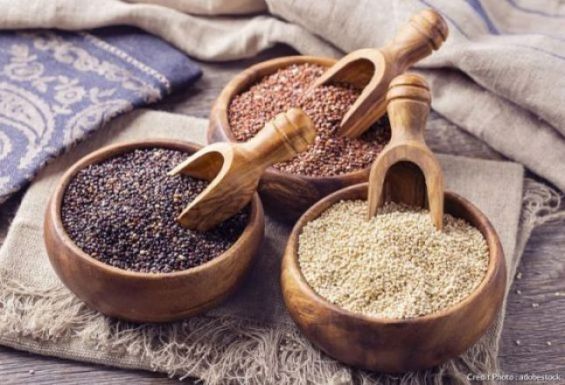The pseudo-cereal of the Amaranthaceae family with multiple nutritional benefits has been introduced in Morocco during the 1999-2000 season, as an alternative to traditional crops such as cereals, which are strongly affected by climate change. Since then, quinoa has emerged as a wise solution and culture that can contribute to national food security.
But this «niche» quinoa market has remained very limited, as indicated by a study by 14 researchers from the Mohammed VI Polytechnic University and the IAV in Rabat. The study entitled «Development of Quinoa Value Chain to Improve Food and Nutritional Security in Rural Communities in Rehamna, Morocco: Lessons Learned and Perspectives» indicates that «in order for the market to expand, huge effort is required to promote for quinoa and a rise in awareness among consumers about its health benefits».
A market at the mercy of prices and its value chain
Researchers took an interest in the quinoa value chain in Morocco. «The economic analysis showed that under rainfed conditions production cost at harvest per hectare varies from 6650 to 7900 MAD (739–878 USD) for the mechanized and manual production mode». «While under irrigated conditions the production cost increased to 18.445 and 19.695 MAD·ha− for the mechanized and manual production mode», the study explained.
This study also presents a SWOT analysis of the value chain of this pseudo-cereal, revealing that «traditional production and valorization and the lack of using intensive production tools» is one of the weaknesses of quinoa market expansion in Morocco.
«Thus, quinoa price in Morocco remains relatively high above middle class consumer’s purchasing power even at farmgate and only rich people can afford it. This way the local quinoa products with a high price and relatively lower quality could never compete with an imported one», they regretted.
The study adds that another sticking point, limiting the expansion of the sector lies in its value chain, with a «lack of promotion around quinoa benefits using public channels and social media. which is considered a key point for any new product development».
«Quinoa is not yet a well-established crop in the local production systems. A lack of farmers’ experience and the possibility of a shortage of inputs, especially planting materials, could possibly result in greater yield variability among farmers».
Supporting production
The research indicates, however, that quinoa is proving to be a «potential and resilient» crop. «Quinoa offers better remuneration and yield under both rainfed and irrigated cultivation», it adds. In this sense, the results of several scenarios indicate that «quinoa is highly profitable, yielding a net margin ranging from 21.100 to 111.555 MAD depending on the scenario».
While recommending that its farmers adopt mechanized tools and seed treatment in order to reduce production costs and improve their income, the study suggests that farmers must come together so they can have easy access to said mechanized tools. It also proposes several development actions for each component of the value chain that can be implemented within the framework of a national quinoa program. The latter «may be funded within the new Moroccan agricultural development plan called the ‘green generation’».
The researchers also recommend «setting up support for all players in the sector through coordination of the quinoa interprofession in Morocco supported by the structures of the Department of Agriculture».
«Morocco’s situation within the Maghreb region places it in an advance position in the development of quinoa value chain», researchers concluded.





 chargement...
chargement...













